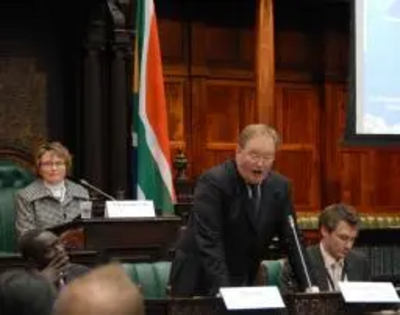LI Cape Town executive meeting report
By Robert Woodthorpe-Browne
Helen Zille, leader of the Democratic Alliance, the official opposition in South Africa, former mayor of Cape Town and current premier of the Western Cape, welcomed over 110 liberals from all over the world to the 185th Executive Committee of Liberal International.
Colin Eglin, a veteran with the late Helen Suzman of the campaign against apartheid, and a patron of LI, chaired a meeting addressed by black and white parliamentarians from the national parliament and the Western Cape parliament in the Old Assembly Chambers of the South African Parliament.
These are infamous as the place of the murder in 1966 of premier Henrik Verwoerd, and the passing of apartheid legislation over several decades. There were descriptions of the changes being made to improve the lives of people in the DA controlled areas, in the teeth of fierce opposition from the African National Congress, which believes it has have a divine right to rule.
In an echo of the expenses row in the UK, Lindiwe Mazibuko MP published a daily running total of ministerial expenditure on top-of-the-range cars, posh houses (with or without duck houses) to the delight of the South African media and the fury of the ANC, over a period of a year.

Helen chaired sessions on the liberal philosophy of devolution of power, with LI President Hans van Baalen MEP, Lamine Ba, president of the African Liberal Network and DA international officer Tim Harris MP.
Overseas speakers were Flo Clucas, chair of the ALDE Group in the EU Committee of the Regions, Senator Art Eggleton, former mayor of Toronto and Fu-Mei Chang from Taiwan.
Helen noted the presence of delegates from the 27 African liberal parties who are members of the African Liberal Network.
"The Democratic Alliance is a party of all of the races in South Africa and we welcome the chance to work with our fellow African parties in the cause of replacing the mistaken philosophy of socialism, embraced at independence in most countries, with liberalism, the philosophy of the 21st century which Africa so sorely needs".
At the administrative session, the UK delegation (representing the party and Liberal International, British Group) was led by myself as international relations committee chair - I had earlier represented the Lib Dems on the LI Bureau - supported by LI Patron Richard Moore, Phil Bennion, Jonathan Fryer and Peter Bancroft.
A resolution was passed on localism, proposed by the Lib Dems and based on the resolution passed in Liverpool, adapted to the situation in other countries.
Other resolutions dealt with media freedom, citing South Africa and Italy, and the protection of individual rights in so many countries where these are abused. Presidential statements were made concerning the situations in Madagascar and Congo and it was agreed that a delegation should be sent to Ivory Coast in advance of the second round of the presidential elections, which are likely to see the election of a liberal president, Alassane Ouattara, a former prime minister.
The next executive meeting is likely to be in Ottawa, with a congress later in 2011 in Philippines, at the invitation of their new president Benign Aquino.
Delegates the following day toured housing projects and the shanty towns surrounding Cape Town, learning of the improvements made to the infrastructure by the DA government, and of the efforts to combat the sort of criminality illustrated by the murder the previous day of a British tourist.
We were told that the offer of free abortion to those wanting it had, 16 years later, resulted in a 70% drop in gang crime both in South Africa.
Some12,000 new housing units are built each year, and 18,000 new requests come in. Our colleagues have their hands very full, but are aiming to set an example for other South African provinces to follow.